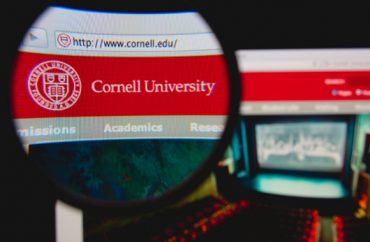
UPDATED
A Cornell University STEM job search used DEI statements to weed out a large number of candidates who did not fit a certain ideological profile, candidates who also were likely older, white and “too qualified,” according to internal documents obtained by the Cornell Free Speech Alliance.
The alliance published a 10-page report Tuesday outlining what it called a “case study” in which an unnamed STEM department used DEI statements as its primary criteria, eliminating at least 21 percent of solid yet undesirable candidates under a DEI rubric.
“Referring to the goal of ‘equity’ (i.e. equitable outcomes in hiring), these more experienced (and likely older and less BIPOC) candidates were eliminated from further consideration for being too qualified,” the report alleges.
The report does not republish the internal documents, nor cite its unnamed “whistleblowers.”
“The ‘whistleblowers’ who have provided these reports to CFSA have requested strict confidentiality due to fear that, if their identities or departments were identified, their employment would be terminated by Cornell as punishment for their exposing unlawful hiring processes now practiced by the university,” the report states.
A Cornell spokesperson declined Wednesday to comment on the report to The College Fix.
The alliance also alleges that although the university claims DEI statements are not required as part of the application process, they are:
“Cornell’s website language has migrated on its use of DEI Statements from being ‘required’ to being ‘asked for’ to being ‘invited’ to being ’embedded in other applicant submittals.’ However, subsequent to making such website language changes, Cornell still employs DEI Statements as an absolute ‘litmus test’ to reject faculty candidates whose personal views on social / political topics which are unrelated to their field of expertise do not conform to Cornell’s DEI dogma.”
The alliance argues these practices violate anti-discrimination laws.
“The end result of this DEI screening was rejection of 21% of applicants without a full comparative review of their academic credentials promised by Cornell. Based on a review by CFSA legal advisors, such practices are discriminatory and constitute violations of both US and New York State Anti-Discrimination and Employment Law,” the report alleges.
The alliance ends its report by stating its STEM case study is the tip of the iceberg.
“CFSA has received additional ‘whistleblower reports’ from on-campus Cornell personnel which expose other discriminatory DEI abuses employed by the university. In particular, these CFSA HOTLINE reports describe blatant racial and demographic profiling which purposefully exclude great numbers of well-qualified faculty candidates from consideration while focusing only on those applicants possessing specific ‘preferred identity’ characteristics,” the report alleges.
The report’s publication comes on the heels of the announcement that Cornell President Martha Pollack is retiring at the end of June.
The embattled leader has been the target of scorching criticism in recent years from both alumni and major donors who argued she has allowed diversity, equity and inclusion dogma to infiltrate the curricula, has not done enough to stop rampant antisemitism from festering on campus, and quashed intellectual diversity even while declaring Cornell a safe haven for free speech.
Her retirement, which some consider a resignation, also comes after unceasing activism by the Cornell Free Speech Alliance, which has documented the school leader’s missteps in recent years and developed a listserv of tens of thousands of Cornell alumni, sending out its criticisms in great detail over the last three years.
The alliance published a 100-page report last August that called for sweeping policy changes on campus that included adding free speech training to freshman orientation, implementing the famous free speech Chicago Principles, eliminating DEI course requirements, removing its anonymous bias reporting system, and providing students robust due process.
In an emailed statement to The College Fix on Wednesday, the alliance said the report will help better inform trustees and other stakeholders and hopefully spur reform — in particular addressing the group’s 20 policy recommendations.
Current campus leaders must lay “the groundwork for the policies of the next Cornell president … who must be chosen and tasked to bring major reforms to Cornell in order to return the university to its founding mission of merit-based open inquiry and academic freedom,” the alliance told The Fix.
Editor’s note: The article and headline has been amended to better reflect the report.
MORE: After increasing demands for her resignation, embattled president of Cornell announces retirement
IMAGE: Shutterstock
Like The College Fix on Facebook / Follow us on Twitter






Please join the conversation about our stories on Facebook, Twitter, Instagram, Reddit, MeWe, Rumble, Gab, Minds and Gettr.